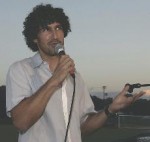‘Survivor’ winner talks AIDS in Africa

When he first started his own charitable organization after winning Survivor: Africa, Ethan Zohn said he was dismayed to learn about the number of people had fallen victim to the AIDS epidemic in Africa, a virus both preventable and treatable.
That’s why he says he’s committed to raising awareness about HIV and AIDS.
Zohn discussed the origins of his charity and more at the USF Soccer Stadium on Tuesday night as part of the University Lecture Series. More than 60 people were in attendance to hear Zohn relay his life experiences and how they molded his personal character.
Zohn began his speech with jokes about everything from pop culture to his Jewish upbringing, and for the first few minutes of the presentation, he broke the ice by recalling an embarrassing moment.
Some embarrassing pictures of him wearing women’s clothing while attending Vassar College ended up in the National Enquirer with the headline: “Survivor Ethan Zohn is a cross dresser!” Zohn later showed a reel of clips of his favorite moments on Survivor to the accompaniment of a song highlighting his exploits, both good and bad, on the reality series.
Zohn said he believed he left the experience a stronger man, as he had to rely on himself in an environment that, by its very nature, bred loneliness and isolation. According to Zohn, the three key traits he brought to the game were character, personality and personal values. Zohn said later that he wasn’t aware he had these traits until he was put into a situation like Survivor.
At one point, Zohn asked audience members what they would do if they won $1 million. He said winning the prize money made him evaluate the kind of person he was, and he knew he wanted to use the money to better other peoples’ lives.
From there, he and three of his soccer teammates from Vassar founded “Grassroot Soccer,” which Zohn personally oversees via trips to Africa four months out of the year. Today, “Grassroot Soccer” has active programs in eight African countries where HIV/AIDS are prevalent. By 2008, Zohn estimated more than 1 million African children would have completed his HIV/AIDS prevention courses.
For Zohn, his determination to educate people about the dangers of HIV/AIDS is personal.
When Zohn played professional soccer in Zimbabwe, one of his teammates got sick and never returned to practice. It was only after he had returned to the United States that Zohn learned from his teammate’s brother that he had died from “the slims,” a euphemism for AIDS.
His resolve only strengthened after meeting HIV-positive children at a hospital in Kenya while filming Survivor. While there, he gave away his luxury item, a small hacky sack, to one child.
“I hope (the child) got to forget about his problems and could be a kid again for that one moment,” Zohn said.
Finally, Zohn challenged the audience to use their values and character to make a difference in the lives of others.
He asked the audience to write down one thing that breaks their heart the most and find a way to work at fixing the problem. After receiving the challenge, one student relayed her experiences starting a non-profit long-term care center for children with AIDS in Haiti. She said having a clear vision and sticking to a goal are two keys to success.
Another student asked how she could make a difference with her limited resources.
“Just do all you can with what you have,” Zohn said. “Now is the best time to make a difference, since you’re in college and have a lot of resources at your disposal.”
Zohn concluded his speech on a hopeful note and encouraged students to “leave motivated”.
Some lecture-goers took the message he conveyed to heart.
“Ethan inspired me with his personal stories and passion in the fight against HIV/AIDS,” sophomore Rose Rezaei said.
Sara Carmichael, a sophomore, echoed Rezaei’s sentiments.
“It makes me want to be that dedicated to something that does so much good in the world,” she said.





